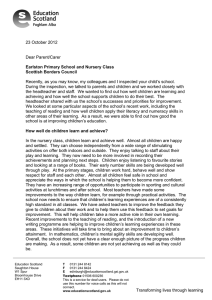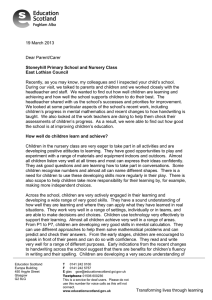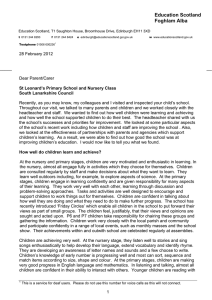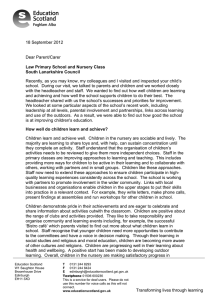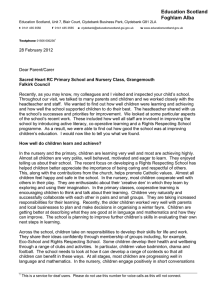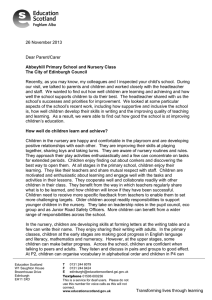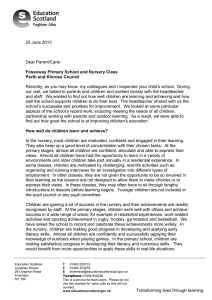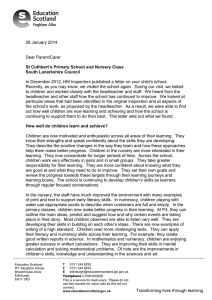18 December 2012 Dear Parent/Carer
advertisement
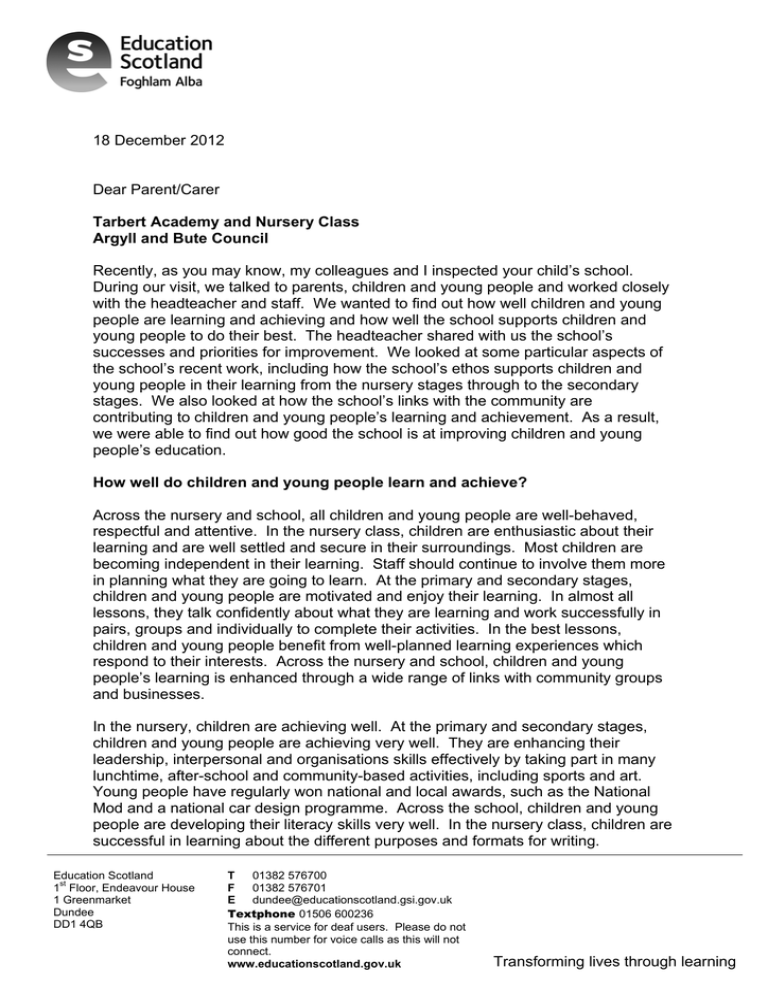
18 December 2012 Dear Parent/Carer Tarbert Academy and Nursery Class Argyll and Bute Council Recently, as you may know, my colleagues and I inspected your child’s school. During our visit, we talked to parents, children and young people and worked closely with the headteacher and staff. We wanted to find out how well children and young people are learning and achieving and how well the school supports children and young people to do their best. The headteacher shared with us the school’s successes and priorities for improvement. We looked at some particular aspects of the school’s recent work, including how the school’s ethos supports children and young people in their learning from the nursery stages through to the secondary stages. We also looked at how the school’s links with the community are contributing to children and young people’s learning and achievement. As a result, we were able to find out how good the school is at improving children and young people’s education. How well do children and young people learn and achieve? Across the nursery and school, all children and young people are well-behaved, respectful and attentive. In the nursery class, children are enthusiastic about their learning and are well settled and secure in their surroundings. Most children are becoming independent in their learning. Staff should continue to involve them more in planning what they are going to learn. At the primary and secondary stages, children and young people are motivated and enjoy their learning. In almost all lessons, they talk confidently about what they are learning and work successfully in pairs, groups and individually to complete their activities. In the best lessons, children and young people benefit from well-planned learning experiences which respond to their interests. Across the nursery and school, children and young people’s learning is enhanced through a wide range of links with community groups and businesses. In the nursery, children are achieving well. At the primary and secondary stages, children and young people are achieving very well. They are enhancing their leadership, interpersonal and organisations skills effectively by taking part in many lunchtime, after-school and community-based activities, including sports and art. Young people have regularly won national and local awards, such as the National Mod and a national car design programme. Across the school, children and young people are developing their literacy skills very well. In the nursery class, children are successful in learning about the different purposes and formats for writing. Education Scotland st 1 Floor, Endeavour House 1 Greenmarket Dundee DD1 4QB T 01382 576700 F 01382 576701 E dundee@educationscotland.gsi.gov.uk Textphone 01506 600236 This is a service for deaf users. Please do not use this number for voice calls as this will not connect. www.educationscotland.gov.uk Transforming lives through learning At the primary and secondary stages, children and young people use their literacy skills regularly across a range of curricular areas. Similarly, they are developing their numeracy skills effectively and steadily in different curriculum areas. Children and young people understand the importance of having a healthy lifestyle. The school needs to ensure that children’s and young people’s learning in health and wellbeing is more coherent. At S1 to S3, young people are making suitable progress appropriate across their broad general education. At S4-S6, the school’s performance in national examinations has generally shown an improving trend and in key measures is above the national averages. Almost all young people move on to employment, higher or further education when they leave school. How well does the school support children and young people to develop and learn? Across the nursery and school, staff know the children and young people very well as individuals. In the nursery, staff identify children’s emotional and social needs accurately and respond to them effectively. There is scope to extend children’s learning further, ensuring that activities are more challenging for all children. At the primary and secondary stages, tasks and activities are well-matched to learners’ needs in almost all lessons. Staff give high-quality support to learners in class. Support staff interact very well with children, young people and teaching staff. Pastoral care is of a high standard and staff work well to engage and support children and young people with a range of needs. Support for learning and guidance teachers and all support staff work very closely together to provide the relevant support to meet children and young people’s additional learning needs. The school has a very strong, caring and inclusive ethos. It works effectively with a range of agencies to deliver positive outcomes for children and young people. Across the school, almost all teachers have reviewed their courses, taking account of Curriculum for Excellence guidance. Across the primary stages and from S1 to S3, children and young people are benefiting from a broad general education. At the primary stages, teachers plan effectively for all curricular areas and are making links across different subjects. At S3, young people are beginning to specialise in subjects as part of moving into their senior phase. From S3 to S6, young people can choose vocational and skills for work courses to follow a more practical pathway. The school takes a flexible and personal approach when matching young people’s curricular choices. Currently, it is not meeting the national guidance for provision in religious education. However, the school has plans to address this aspect. It has strong transition arrangements for children moving from several nurseries to the primary and from its primary and other primary schools to the secondary. There is scope to build more on young people’s prior learning when they move into S1. Successful partnership working with local schools and Argyll College has enabled the school to offer additional courses. There are a number of effective and innovative volunteer-led community projects which support the curriculum. These provide good opportunities for young people to learn in a community setting. How well does the school improve the quality of its work? Across the nursery and school, all staff are reflective as individuals, keen to develop professionally and to improve children and young people’s learning experiences. 2 At the secondary stages, the school has effective approaches to tracking and monitoring young people’s progress. The headteacher provides very strong and effective leadership. This has resulted in raised standards, improved learning and teaching methodologies, and increased attainment and achievement. The depute headteachers support the headteacher well and, working alongside principal teachers, are contributing well to the development of learning and teaching. Most teachers are members of a school working group and have led many new developments linked to the curriculum and assessment. Classroom and support assistants work effectively with teachers to improve children and young people’s learning. Children and young people have suitable opportunities to give their views, for example, at the pupil council and student council. The school should continue to develop the extent to which these discussions lead to improvement. This inspection of your school and nursery class found the following key strengths. • • • • • Confident, well-behaved and articulate children and young people. High standards of attainment and achievement through strong and effective approaches to learning and teaching. Caring and inclusive ethos which helps children and young people to achieve their best. Community links across the nursery class and the school. The headteacher’s leadership in managing change and effecting improvement. We discussed with staff and the education authority how they might continue to improve the school and nursery class. This is what we agreed with them. • • Establish rigorous approaches to tracking and monitoring children’s progress in the nursery and primary. Continue to engage in effective joint planning of the curriculum and learning in order to maximise the potential of a 3-18 school. What happens at the end of the inspection? We are satisfied with the overall quality of provision. We are confident that the school’s self-evaluation processes are leading to improvements. As a result, we will make no further visits in connection with this inspection. The local authority will inform parents about the school’s progress as part of the local authority’s arrangements for reporting to parents on the quality of the schools. Hakim Din HM Inspector Additional inspection evidence, such as details of the quality indicator evaluations, for your school can be found on the Education Scotland website at http://www.educationscotland.gov.uk/inspectionandreview/reports/school/primsec/Ta rbertAcademyArgyllandBute.asp. 3 Please contact us if you want to know how to get the report in a different format, for example, in a translation. You can contact us at enquiries@educationscotland.gsi.gov.uk or write to us at BMCT, Education Scotland, Denholm House, Almondvale Business Park, Almondvale Way, Livingston EH54 6GA. If you want to give us feedback or make a complaint about our work, please contact 01506 600200, or write to us at the above address or e-mail: feedback@educationscotland.gsi.gov.uk 4
